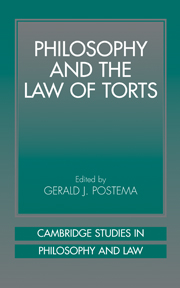Book contents
- Frontmatter
- Contents
- Contributors
- 1 Introduction: Search for an Explanatory Theory of Torts
- 2 A Social Contract Conception of the Tort Law of Accidents
- 3 Responsibility for Outcomes, Risk, and the Law of Torts
- 4 The Significance of Doing and Suffering
- 5 Tort Law and Tort Theory: Preliminary Reflections on Method
- 6 Corrective Justice in an Age of Mass Torts
- 7 Economics, Moral Philosophy, and the Positive Analysis of Tort Law
- 8 Pluralism in Tort and Accident Law: Towards a Reasonable Accommodation
- References
- Index
4 - The Significance of Doing and Suffering
Published online by Cambridge University Press: 01 July 2009
- Frontmatter
- Contents
- Contributors
- 1 Introduction: Search for an Explanatory Theory of Torts
- 2 A Social Contract Conception of the Tort Law of Accidents
- 3 Responsibility for Outcomes, Risk, and the Law of Torts
- 4 The Significance of Doing and Suffering
- 5 Tort Law and Tort Theory: Preliminary Reflections on Method
- 6 Corrective Justice in an Age of Mass Torts
- 7 Economics, Moral Philosophy, and the Positive Analysis of Tort Law
- 8 Pluralism in Tort and Accident Law: Towards a Reasonable Accommodation
- References
- Index
Summary
Introductory: Understanding Tort Law
Nor should we make the same demand for an explanation in all cases. Rather, it is sufficient in some cases to have “the that” shown properly. This is so where “the that” is a first thing and a starting point.
Aristotle, Nicomachean Ethics, 1098b1Negligence cases constitute the largest item of business on the civil side of the nation's trial courts. Yet we lack a theory to explain the social function of the negligence concept.
Posner, A Theory of NegligenceModern tort law looks out on a situation which is ubiquitous in human affairs and inherent, as a possibility, in the fact of human action: a situation in which the actions of one person are connected to the misfortune of another. Nowhere does the law attach significance to this just as such. Rather, throughout the world today, tort law asks: Is the plaintiff's suffering a consequence of some impropriety on the defendant's part, or is it a mere misfortune, a case of bad luck? As “mere misfortune,” the plaintiff's suffering would be without legal significance, something on par with a natural event, like a destructive turn in the weather. But if there is impropriety – if, for example, the likely prospect of the plaintiff's suffering makes it “negligent” for the defendant to have acted as she did – then the plaintiff is entitled to receive, and the defendant obligated to pay, compensation.
- Type
- Chapter
- Information
- Philosophy and the Law of Torts , pp. 131 - 182Publisher: Cambridge University PressPrint publication year: 2001
- 10
- Cited by

